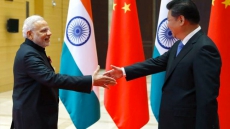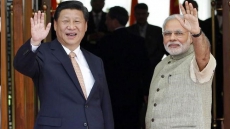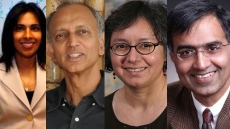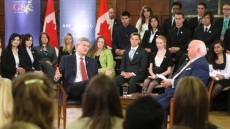India and China agreed to pursue an "early settlement" of the vexed border issue, including "actively seek a political settlement", as Prime Minister Narendra Modi held talks with Premier Li Keqiang here on Friday, the second day of his China visit that saw both sides ink 24 agreements.
Modi called for a resolution of the boundary issue in a manner that "transforms the relationship" and does "not cause new disruptions", during a talk at the Tsinghua University.
Modi reiterated his call for clarifications on the 4,000-km Line of Actual Control, saying it could be done "without prejudice" to either side's position on the disputed boundary question.
In a reference to terrorism, Modi said the spreading tide of extremism and terrorism was a threat to both the and "its source is the same region," alluding to Pakistan without naming it. "We both face instability in our shared neighbourhood that can threaten our security and slow down our economies," he said while addressing the students.
During his media address after talks with Li, Modi said he has "stressed the need for China to reconsider its approach on some of the issues that hold us back from realising the full potential of our partnership. I suggested that China should take a strategic and long term view of our relations" and added that he found the Chinese leadership "responsive".
A joint statement issued after the talks said the two sides "will resolve outstanding differences, including the boundary question, in a proactive manner". It said their differences "should not be allowed to come in the way of continued development" of bilateral relations. Peace and tranquility on the India-China border was recognised as an important guarantor for the development and continued growth of bilateral relations, the statement said.
Later in the day, Modi left for Shanghai where he is scheduled to address CEOs of Chinese companies on Saturday morning. He is also expected to address another business meeting and sign some business-related agreements.

But earlier, both sides agreed to enhance exchanges between the border commanders, and establish border personnel meeting points at all sectors of the India-China border areas.
Modi, who is known to have raised the issue of the China-Pakistan economic corridor that cuts through Pakistan Occupied Kashmir with both Premier Li and President Xi Jinping as also Beijing's $46 billion investment in Pakistan, referred to the issue only obliquely in his talk at Tsinghua University.
He said with both countries increasing their engagement in the shared neighbourhood, it "calls for deeper strategic communication to build mutual trust and confidence".
Modi said that both should ensure that their ties with other countries "do not become a source of concern for each other".
In another oblique reference - to China resisting India's membership to the Nuclear Suppliers Group (NSG)- Modi said that both countries are independent and neither "can be contained or become part of anyone's plans".
"China's support for India's permanent membership of a reformed UN Security Council, and for India's membership of export control regimes like Nuclear Suppliers Group will do more than just strengthen our international cooperation," Modi said. Pakistan has objected to India's membership of the NSG, a 48-nation body that ensures that civilian trade in nuclear materials is not diverted for military purposes.

The joint statement says that the Chinese side "took note of India's aspirations to become a member of the NSG", indicating no change of stance by Beijing. On India's bid for membership of the UN Security Council, the joint statement says China "understands and supports India's aspiration to play a greater role" in the UNSC, which has remained Beijing's stand all along.
Modi also chose the Tsinghua University to announce the decision to extend electronic tourist visas to Chinese nationals.
In his media statement in the Great Hall of the People, Modi said he had sought "tangible progress" on issues relating to visa policy and trans-border rivers and that he had discussed "some of our regional concerns".
On bilateral trade, both sides agreed to take necessary measures to remove impediments, facilitate greater market access to each other's economies and also resolved to take measures to alleviate the skewed bilateral trade. The two sides have inked a MoU on consultative mechanism for cooperation in trade negotiations.
The two sides also inked agreements on setting up provincial partnership between Karnataka and Sichuan and sister-city relationships between Aurangabad-Dunhuang, Chennai-Chongqing and Hyderabad-Qingdao.
Modi said both President Xi and Premier Li "were very receptive" to the concerns he had raised on the growing trade deficit, at around $37 bn. "We look forward to early impact on the ground".
Both have agreed to open consulates in Chengdu and Chennai, which Modi said reflects the growing mutual confidence and commitment to expand bilateral ties.
Modi and Li also inaugurated the first India-China Forum of State and Provincial Leaders here. Modi said that greater cooperation between India and China at the state and provincial level would help enhance cooperation and promote greater people-to-people contacts.

During their visit to the Temple of Heaven, Modi clicked selfies with Li and also with the students who took part in the Yoga-Tai Chi joint event on Friday.





